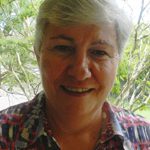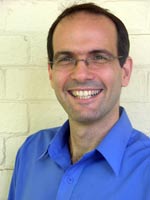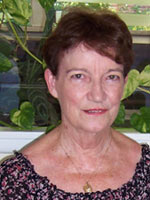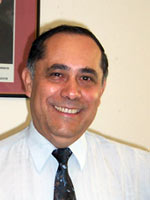PAST DIRECTORS
Clyde Cosentino
See related entry below. Clyde was CMPC Cross Cultural Pastoral Worker in 2005, Director from 2006 to 2011 and again from September 2014 to September 2019.
Margaret Naylon (January 2013 – September 2014)
Ms Margaret Naylon assumes the role as Director of the Centre for Multicultural Pastoral Care alongside her other role as Project Officer of Evangelisation Brisbane working in the area of ecumenism and interfaith relations.
Margaret’s background is in teaching and she has over twenty years’ experience working in Brisbane Catholic Education Primary Schools.
Sr Anne Surtees osu (2011 – 2012)
I am delighted to be working in the Centre for Multicultural Pastoral Care. During the first few weeks in my role I have been connecting with the many groups that are operating in the Archdiocese both government and non-government. Gradually I have been meeting some of the many chaplains who are working with the many different cultures living in this archdiocese. The Multicultural Fiesta held in the grounds at Inala was a wonderful introduction to the role. The many cultures present in the Archdiocese each bring a wonderful richness to the celebration of our faith. May we continue to journey together in our faith and our living.
Clyde Cosentino (2006 – 2011; September 2014 – September 2019)
Being truly Christian demands that we provide this hospitality with all of our heart, mind and soul.
I have been privileged to see the staff at CMPC working together in pastoral care, as a real presence of the Church working in the lives of many persons who are from a “multicultural background”. CMPC seems to reflect the “face” of the Church to migrants and refugees (Christian and non- Christian alike) seeking support, hope and accompaniment in their lives, in the area that is covered by the Archdiocese of Brisbane. I have had the opportunity over the last number of years working with migrants and refugees to see how closely CMPC works and networks with the other relevant agencies (government and non-government alike), and how pastoral care is shown to be more than simply “mouthed words”.
There is always a tendency for us to want to understand what does “multiculturalism” really mean? That question will be asked for a very long time and many answers will be espoused. I was first taught that as soon as we speak in “isms” we immediately minimise and restrict a concept to nothing more than a science; to be theorised, defined and contained in manageable boundaries. As human beings we hate to see ourselves “losing control”. It is human nature that we feel that we must give definition and meaning to concepts that, if foreign and unfamiliar, need to be brought into an understanding that suits our lifestyles, our culture and way of life. Once we have defined this concept and contained its meaning in a way that makes sense to us, we are happy to associate ourselves with this concept and to work under its banner and to call it “multiculturalism”. This token participation is far removed from the life of Christ in the Gospel.
We will hear people say that they have formulated a definition that incorporates the totality of the word “multicultural”. Others will say that they have created several definitions that reflect the sum of the totality of this word. There is nothing wrong in doing this – we need to try and understand. However, we tend to overlook the fact that culture comes out of the life, activities and experiences of human beings wherever they may exist and pastoral care is the offering of ourselves in humility to the differences that inevitably arises from this. Every parish, every diocese and every archdiocese throughout the world encounters this phenomenon daily. It has nothing to do with an anthropological study of humanity. It is all about the faith that is Christ, there for all of us to see in the Gospels. Our humble service to, and accompaniment of, the migrant, refugee claimant and refugee in our Church, both local and universal, will be the litmus test to how well we live the Gospel and how we will be judged as Christians.
“I was a stranger and you welcomed me”. Being truly Christian demands that we provide this hospitality with all of our heart, mind and soul. We, as Christians, need to understand that we cannot escape this responsibility. We must embrace it as eagerly as we give it. Christ would ask nothing less from us.
Clyde was CMPC Cross Cultural Pastoral Worker in 2005, Director from 2006 to 2011 and again from September 2014 to September 2019.
Mary Gavin (2005 – 2006; 1990 – 1994)
My philosophy has always been to be there for every person and to treat him/her as I would hope that he/she would treat me if I were in similar situation.
Over the past 36 years it has been my privilege to live out my faith commitment in the often difficult, but most rewarding ministry, of pastoral care to migrants, refugees, asylum seekers and people on the move here in the archdiocese of Brisbane and the wider Church of Queensland.
To walk with and to support these marginalised people has been a very rich and humbling experience for me. I have been challenged on countless occasions to grow in faith. I have been inspired by the faith of many of the refugees who have come from Countries around the world and impressed by the sincerity of those of other faiths especially the Muslims I have encountered in more recent years.
My work in providing pastoral care has daily made me aware of how much I need to place my complete trust in the Lord as I meet and respond to the often complex problems of those who are some of the most marginalised people.
Over the years it has been my privilege to work with people from all parts of the world offering assistance and endeavouring to help them settle in a new and strange land. On a more practical level my experience has taught me that when migrants and refugees come to you with one problem, if by your body language, you indicate your concern and welcome they will usually have a list of problems and needs to present to you. Realistically, they know and I know that we can’t solve all of these but if someone is prepared to be there for them it makes life more liveable for them.
Over the years I have delighted in the opportunity to learn more about the Countries from which they come as this has enabled me to understand more about them and how best I can care for them. As an Anglo/Celtic Australian born, today I am one of a minority of people working in this important ministry. In many ways it gives me a greater ability to be open to all cultures and my many years of experience make me realise that there are no ‘experts’ in this area and just how much we have to learn across cultures.
My philosophy has always been to be there for every person and to treat him/her as I would hope that he/she would treat me if I were in a similar situation. I thank God every day for the richness and variety this ministry has brought to my understanding and expression of my faith.
Mary Gavin was CMPC Director from 2005 to 2006. Mary was also Director of Mission and Immigration from 1990 to 1994.
Mary passed away on 16 April 2014. [Memorial Service]
Jose Zepeda (1994 – 2005)
There is something else that God has granted me as a privilege, since my arrival in Australia. I have lived among, worked and experienced the life of the migrant, refugee and asylum seeker and other people on the move.
Soon it will be 20 years since I was forced to leave my people, my land and my work in order to share my life and my faith in Jesus Christ with other brothers and sisters in Australia. I thank God every single day for this opportunity and that I will always take it as a blessing and an act of God’s grace.
There is something else that God has granted me as a privilege, since my arrival in Australia. I have lived among, worked and experienced the life of the migrant, refugee and asylum seeker and other people on the move.
Firstly, I have learnt about the life of those Catholic Ethnic Communities in Brisbane. Every experience has left me with a memory of faces of happiness, joy, suffering, isolation or uprootedness: Phone calls to share personal concerns when a family member was left behind in a Refugee Camp, or a member of their family has been killed in a war. I share their feelings of powerlessness to do anything. They find hope in ringing me and asking me to come and pray together with them. I have lived their anxiety when they ask questions that their gut feelings have partially answered. I have witnessed their surprise at the smile or hospitality offered to them out of faith and Christian love, by complete strangers. I have experienced the concrete challenges that I encounter in my every day work such as barriers of racism, discrimination, abuse, disempowerment, injustice, and cultural domination.
I could not overcome all this unless I see it as an act of faith to respond to the Jesus who is incarnated among those with whom I am working and sharing my life. Every one of these experiences leaves me with a visible mark on my spirit and gives me strength. My soul becomes sensitive; my mind is challenged by the humanity of Christ’s presence among those I encounter. My attitude is affected by the compelling call to understand the Gospel. Often I am fearful of living out the mission with passion for the Reign of God, placed in this world at this time.
However, there is something in all these experiences, which makes me begin to be engaged in a process, a Journey of Faith where I have to learn to listen, to realise how poor I am in my faith. The migrants, refugees and the asylum seekers, particularly those who are from other Faiths such as Islam, make me feel that unless I experience all the above, I have no right to enter their world. To know them, to share with them their fears, joys and moments of spiritual pondering, praying together with them makes me realise that God has placed me in a Sacred Space. A place for me to see Jesus Christ’s evangelical love in a tangible form in the faces, bodies, spirits living among the people to whom I am trying to minister.
In Brisbane I share life with the migrants and refugees who pray, sing, and celebrate their Catholic Faith as well as welcoming some of these migrants and refugees into our Catholic Faith and sharing their joy. They listen to God’s Word, priests preaching in their mother tongue. Every Sunday at least 13 or 15 Communities have Mass in different languages.
It is only thanks to trying to live out my faith and therefore my fidelity to the Gospel that I am aware of the complexity and difficulties that confront and challenge me. My everyday work is a hard experience. The hard part comes out of my limitations, powerlessness, my often incapability to come closer, the non-readiness to truly listen to their needs or their challenging demands when they require a joy “today”. When they want and need a house close to transport, a hospital and shops but can’t afford it. The limitations that I experience out of my ignorance of the language, culture and customs when I need to ask a question. The conversations when they expect my opinion which I know is narrow.to know their life, their way of thinking, their feelings, their thoughts. My own racism and prejudices surface and emerge out of frustration, differences or fears of the unknown.
Unless I pray every day and unless I am supported by my co-workers, my parish community and attend my weekly Sunday Eucharist, I do not believe I would be able to share that evangelical love. That love that Jesus Christ grants me to bring in solidarity to share with the migrant, the refugee and the asylum seeker. These people who are the abused, are in a position of victims, excluded from society or marginalised. Often they are the invisible people living among us.
Our Gospel teaching demands of us to bring them to the preferential place of those who Jesus Christ lives among. To transform the mind, soul, spirit, conscience and attitude of people in order that the spirit of the migrant, refugee and asylum seeker becomes the light of the Gospel for us to be enriched.
Jose Zepeda was Director of the Centre for Multicultural Pastoral Care from 1994 to 2005.
[More on History]
[About Us]
[Logo]
[History]
[Staff]